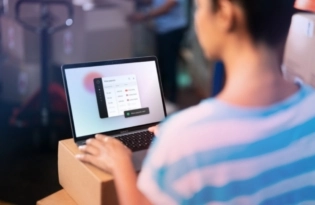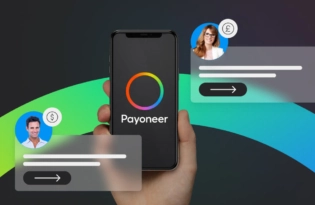The complete guide to starting your dropshipping business
Dropshipping has become popular among those seeking a secondary income. To succeed in dropshipping, you need to understand the process. This article provides the necessary information to determine if dropshipping is right for you.

In partnership with
Making money online is the sweet spot people look for in today’s economy, more than ever before. Whether you aspire to be an online entrepreneur or are just looking to make a secondary income, dropshipping has become a popular choice to do so.
When it comes to starting a dropshipping business, as with any type of new venture, there is a learning curve. And although the dropshipping business model is straightforward, to have a successful and profitable dropshipping store, you’ll first need to understand what dropshipping is and how it works.
So, if you’ve been contemplating dropshipping, look no further. By the end of this article, you will have all the information you need to determine if dropshipping is the right online business model for you.
What is dropshipping?
Before we dive deep, let’s go over the basics as the first step. What is dropshipping, and what makes it an appealing online business model?
Overall, the format sets it apart from other eCommerce business models. Here is how it works.
There are three parties involved in the dropshipping business model:
A supplier or manufacturer
You (the dropshipper)
Customer
Therefore, this is how the dropshipping process works:
- A customer purchases a product from your dropshipping store.
- You place the order with your buyer’s information from your chosen supplier.
- The supplier ships the product to your customer.
- The price margin then becomes your profit.
Compared to the standard eCommerce method, dropshipping is much simpler and easier. While standard ecommerce requires you to invest in inventory, store your inventory, and deal with packing and shipping orders, dropshipping only requires you to create a website, add products, and market your store.
Therefore, all you need to start dropshipping is a computer, internet connection, and the motivation to learn. It’s no wonder it took the world by storm.
Plus, once you get the ball rolling and it’s time to scale and expand your business, you won’t need new offices, warehouses, or a massive team of employees.
Ready to start managing your dropshipping payments?
Starting a dropshipping business from scratch
Alright, now that we covered the fundamentals, here is a step-by-step guide to starting your very first dropshipping store. By following these seven steps, you’ll be ready to create a profitable dropshipping business.
Step 1 – Product research
What should I sell?
Knowing what to sell in your store is key to a successful dropshipping business. Therefore, learning how to research and find niches and products is one of the most critical steps.
With that said, don’t worry. There are plenty of methods and strategies to find best-selling items. The three main product-research tactics are:
- Checking what’s selling well for successful dropshippers.
- Searching supplier sites for products with high ratings and lots of reviews.
- Using product research tools like to help narrow down niches and products.
As for product research tools, there are countless options on the market. If you choose to implement a product research tool for your dropshipping store, here are our recommendations.
- eBay dropshipping – To check which niches are in high demand and likely to sell well, use Zik Analytics. Additionally, check supply and competition statistics to find the hottest products to sell.
- Shopify dropshipping – Use Koala Inspector to spy on competitors and discover which products are selling from any Shopify store. After you have your product idea, search for the best supplier to use.
- All dropshipping Selling Channels – To save time on product research and product importing, take advantage of The AutoDS Product Research Tool. Discover hot products from top dropshipping suppliers and add them to your store with a click of a button.
Step 2 – Target audience
Who should I sell to?
When dropshipping, you will have to think about which countries you target. Lucky for us, we can dropship to and from practically anywhere in the world.
Nevertheless, some particular markets are especially popular and profitable.
The top choices for countries/regions to dropship to are:
- The United States
- Canada
- The United Kingdom
- Australia
- New Zealand
- France
- Germany
Step 3 – Study the competition
Who are my competitors?
On to the third step, competitor research. Just like the saying “Keep your friends close, and your enemies closer,” when dropshipping, we need to keep an eye on our competitors from time to time.
When dropshipping, your competitors are the dropshippers selling to the same country/region as you and those selling the same niches/products as you.
Here are methods to help you identify your dropshipping competitors across the different selling channels:
- eBay – Search for your product/niche to see who’s selling it in the search results. Click ‘Sold items’ to check how many sales they made from each listing. It is not enough to check the number of listings; we want to know who has successfully sold it. Also, keep in mind to check the correct eBay site. For example, if you are selling on eBay.com, searching for the product on eBay.co.uk would be ineffective.
- Shopify – Use Koala Inspector’s competitor tool to get insights into your competition. From what products they sell, what suppliers they use, what ads they run, which are successful, and more.
- Facebook marketplace – For now, Facebook Marketplace is an untapped market. Since there are not many dropshippers selling on FB yet, there is no need to worry about competition. Go to your favorite supplier and list their best-selling items.
- Amazon – Amazon and eBay’s processes are the same. Search Amazon for your product/niche to see who else is selling it. We don’t recommend you entirely copy other dropshippers, but you can get some good ideas by researching what they are doing that you’re not.
Step 4: Create Your Store
What is the best selling channel?
Here is where things get serious. Now that you’ve established your foundation, it’s time to select a selling channel and create your dropshipping store.
The rapidly increasing popularity of dropshipping has pushed dropshippers to multiple platforms and has led many of the top eCommerce platforms to embrace it.
However, there are apparent differences between them all. And deciding which is the best dropshipping platform for someone might depend on exactly what they want from a selling channel.
With that in mind, here are the most popular and lucrative platforms to dropship on:
Amazon
It shouldn’t come as a surprise that Amazon is one of the best dropshipping selling channels. With over 300 million active users, it has proven an excellent choice for dropshippers due to the organic traffic.
To set up an Amazon dropshipping store, you first register to Amazon Seller Central and get approved for an Amazon seller account. You’ll be able to start selling as soon as Amazon approves you for a seller account.
Pros:
- Customer trust – Amazon has built trust with their customers, and in return, their buyers are loyal. By dropshipping on Amazon, you can leverage that trust to your dropshipping store.
- Organic traffic – You can start making sales without having to market your store or its products.
- Market diversity – By selling on Amazon, you can easily sell worldwide. Besides Amazon US, you can dropship on Amazon U.K., Canada, Mexico, India, France, Germany, Ireland, Italy, Spain, China, Japan, and Australia.
Cons:
- High competition – As with any big online shopping platform, there are hundreds of thousands of sellers on Amazon. Plenty of those sellers are dropshippers, many of which may be selling the same products as you.
- Seller fees – Amazon charges a hefty commission for every product you sell. There are two selling plans offered:
- Professional – $39.99/mo with no per item fee.
- Individual – No subscription fee but $0.99 fee per item sold.
Shopify
If you’re more interested in selling through your website, then this could be the platform for you. Shopify is a subscription-based commerce platform that lets you start, grow, and manage your eCommerce business.
Pros:
- Private selling site – By choosing to create your own dropshipping store site instead of dropshipping on a marketplace, you get to market your brand more effectively.
- Interface & ease-of-use – Shopify provides a straightforward selling platform. With a clean and intuitive interface, they are known for good user experience.
- Customer service – Since Shopify supports and encourages dropshipping, their customer support team is fully equipped to help you with any issue you may encounter.
Cons:
- Subscription fee – Shopify offers a 14-day trial, allowing you to start for free. However, once your trial is over, you must choose a monthly subscription plan. Subscriptions start from $29.99 for a basic membership and go up to $299 for their advanced plan.
- Marketing – To start making sales on Shopify, you must drive traffic to your site. Unlike a marketplace with millions of existing customers, selling on Shopify requires active marketing methods.
Wix
Similar to Shopify, Wix is another fantastic choice if you want to create your eCommerce shop. The general pros and cons to consider are the same since both are platforms that allow you to build your site and offer similar features.
Note: If you decide to dropship through your own eCommerce store, consider the following factors when taking your pick between Shopify and Wix:
- Pricing
- Customer support
- Design and customization options
- Dropshipping integrations.
Facebook marketplace
The Facebook Marketplace is the newest dropshipping selling channel and one of the most profitable. Opening a Facebook store is quick and easy. Simply sign in to your Facebook account, head over to ‘Marketplace,’ and start listing products.
Pros:
- Untapped marketplace – While the Facebook Marketplace has been around for a while, it has only recently gained popularity amongst dropshippers. That means less competition to worry about.
- Organic traffic – With millions of Facebook users, your listings get massive free exposure effortlessly.
- Zero expenses – Unlike other ecommerce platforms, you can list items for free on Facebook Marketplace. There are no fees or subscriptions in order to sell.
Cons:
- Lack of protection – Selling on Facebook is simple for a reason. Facebook doesn’t vet buyers or sellers, which opens up the platform to scammers and junk.
- US limitation – Overall, to sell on Facebook Marketplace, you must be a US citizen or verify your social security number. Additionally, a US IP address is required to enable shipping options and be visible to all 50 states.
eBay
Although eBay started as an auction-based marketplace and was famous for used products, it has since shifted into an available online platform with all kinds of products. Since it is one of the most popular eCommerce platforms globally, it was one of the first dropshipping selling channels.
If you don’t have an eBay account, you’ll need to sign up to create a store. Once you set up your account, you can create your first product listing.
Pros:
- Easy store creation – Unlike the selling channels mentioned above, you don’t need to build and design a store to start selling or wait to get approved. Simply sign up, set up your account, and start listing products.
- Big customer reach – Selling on eBay allows you to reach hundreds of millions of buyers. In addition to eBay US, there are over twenty eBay sites. Besides the US, the most profitable eBay regions to sell to are Australia, the UK, Germany, France, and Spain.
- No marketing investment – Dropshipping on eBay doesn’t require marketing methods. eBay already has immense traffic, so your products easily get massive exposure.
Cons:
- Selling limits – eBay initially limits the number of products you can sell in your store. If you want to raise the limit and expand your store, you need to reach out to eBay’s support and put in a request.
- eBay protocols – eBay holds sellers to a high standard and keeps a close watch. Seller performance is measured and tracked very strictly. When selling on eBay, be sure to fulfill orders, upload order tracking information, and handle any customer support messages or cases promptly.
Step 5: Stock Your Store
List your first product
After selecting a selling channel and creating your dropshipping store, it’s time to start adding products to sell. When creating a product listing, you need to provide potential buyers with as much information on the product as possible.
You can find all the necessary product information from your supplier’s listing and use it to create yours.
Product information can include, among other things:
- Product Title
- Product Images
- Item Description
- Item Specifications
Also called product importing, creating your product listing can be accomplished in two ways. You can import products manually or use a dropshipping automation tool.
Both methods require the product’s information from your supplier, but here are the main differences between the two.
- Manual Product Importing – Manual product imports are done directly on your selling channel. To do so, take the product’s details (mentioned above), copy and paste them to your listing, and upload the images. Once you have everything ready, finalize the listing.
- Automated product importing – Automatic imports is a feature provided by various dropshipping tools. By using a dropshipping software to import products, you can instantly grab all the product details in just a few clicks. It will save you hours of time and effort. Additionally, automatic importing tools let you import multiple products at a time (since this is not a feature most selling channels offer) instead of importing each product one by one. In the beginning, start with manual imports to get a feel for the selling channel you’re dropshipping on. Just keep in mind that importing automation will save you a great deal of time and effort to grow your store.
Step 6: Market Your Store
Do I need a budget?
Now that you have products in your store, you need to make them visible to buyers. Just like any physical store needs advertising to attract buyers, your dropshipping store needs online marketing in order to drive traffic.
And once you start getting traffic, you’ll need to optimize to increase conversion. There are various ways to market dropshipping products, and each type of selling channel requires a different marketing approach.
So, here are the most profitable marketing methods for each dropshipping selling channel.
PPC ads (pay per click)
Out of all the social media ad options, Facebook Ads and Google Ads are the most powerful ways to promote products. PPC ads target potential buyers based on their location, demographic, and profile information. Once you create your ad, set a budget and run the ad.
Use PPC ads for:
- Shopify
- Wix
- Amazon
Influencer marketing
There are different strategies to influencer marketing, but overall, it is a social media marketing method that uses endorsements and product mentions from influencers.
Since consumers seek product recommendations from influencers just like they do from friends, influencer marketing has become one of the most effective ways to expose consumers to your products.
Use influencer marketing for:
- Wix
- Amazon
- Shopify
Marketing email campaigns
Email marketing works by sending commercial emails to a list of contacts. You can use marketing emails to inform your customers about new sales promotions and build a community around your brand.
Send marketing emails to potential customers to drive more sales and past customers to upsell or encourage future purchases.
Use email marketing for:
- Amazon
- Shopify
- Wix
A great method to obtain email addresses from buyers for email campaigns is creating promotions. For example, email subscriber discounts require buyers to fill in their email addresses.
This is one of the most powerful marketing tools we have today. Plus, we don’t have to pay any third-party traffic sources as the list is ours.
Internal marketing Tools
Besides the standard external dropshipping marketing methods mentioned above, there are also internal marketing tools.
Both Amazon and eBay offer tools within their platform that can help promote your dropshipping listings and increase sales.
eBay
As you can see, eBay dropshippers do not have external marketing methods available to them. Instead, eBay offers two excellent product-promoting tools: Promoted listings standard and promoted listings advanced.
- eBay Promoted Listings Standard – eBay’s standard promoted listing feature increases the visibility of our products by placing ads for them across the eBay network. This way, your listings can reach more consumers. The benefit of using this feature is that there are no upfront costs. eBay will charge you a pre-set percentage of your item’s total sell price, but only after you make a sale.
- eBay Promoted Listings Advanced – The advanced version of eBay’s promoted listing feature works more like an actual PPC campaign and is more effective. Instead of just boosting listing visibility, the advanced promotion feature helps us target specific keywords and compete for a top spot in customer search results. However, the downside is the upfront cost. Unlike the ‘Standard’ option, eBay will charge for every click you get on your ‘Advanced’ promoted listing, whether you made a sale or not.
Amazon
Unlike eBay dropshipping with just the internal marketing strategies, we have both external and internal marketing options for Amazon dropshipping.
- Amazon PPC – Amazon offers an internal sponsorship program, Amazon Pay-Per-Click (PPC). With Amazon PPC, you can create advertisements for your products to make your listings appear higher in Amazon’s search results for specific keywords that you set.
Facebook marketplace
To help you sell your Facebook Marketplace dropshipping products, Facebook provides two internal methods.
- Marketplace listing boosts – To help your listing reach more potential buyers, you can boost your listing. Your listing will then turn into a Facebook ad so more people can see it, which may help you to sell your item faster. Select your total budget with the recommended campaign duration or choose a custom option.
- Marketplace promotions – The second method Facebook offers to help us sell our Marketplace products is their product promotion feature. If you see a product is not selling well, create a promotion with a lower price to help drive sales.
Step 7: Start selling & profiting
Now, to the final step. This is when your time and effort start to pay off. With products in your store and the proper marketing methods in action, sales will begin to flow in.
Once your store starts getting orders, you will need to fulfill them for your buyers by purchasing their desired items from your dropshipping supplier.
The two main ways to process dropshipping orders are:
- Manual order fulfillment – To process orders manually, purchase each product from your supplier with your buyer’s details and wait for them to ship it to your buyer. Once tracking information is available, provide it to your buyer.
- Automated order fulfilment – To automate dropshipping orders, you need dropshipping automation software. Once you connect your dropshipping store to a dropshipping software, the system gets access to all your orders and can process them automatically for you.
Depending on the automation system you choose, you can also use automatic tracking updates.
Ready to start managing your dropshipping payments?
Dropshipping automation
As mentioned above regarding importing products and order fulfillment, dropshipping tools help dropshippers automate various dropshipping processes.
Although it is lovely to start your dropshipping business without automation, there will come a time when an automation tool will become a necessary part of your operation.
Firstly, the time and effort that automation features save us are priceless. Plus, by saving us time, they allow us to focus on growing our dropshipping store into a successful online business much faster.
Furthermore, besides automating product imports or our order fulfillment process, there are many other tasks where automation becomes crucial to the success of your store.
Here is a more comprehensive list of everyday dropshipping tasks that dropshipping tools assist us with through automation.
- Product Importing
- Price & Stock Monitoring
- Order Fulfillment
- Price Optimization
- Customer Service
- Scaling Your Busines
It is essential to get familiar with the various helpful dropshipping tool features we can implement in our business. Let’s go through each dropshipping automation feature to get us started.
Product importing
One of the first dropshipping tasks to automate your business is product importing. Although adding products to a dropshipping store is easy, it is incredibly time-consuming. Manual importing your first few products will do just fine, but it doesn’t end there.
To profit from your dropshipping store without having to spend hours manually adding products one at a time, a product importing tool is critical.
By using an automatic product importer, you can:
- Save countless hours
- Import hundreds of products at once
- Get editing and optimizing features to help improve your listings
- Schedule listing And so much more.
Price/stock monitoring
Second, comes price and stock monitoring for your dropshipping products. Since we are selling products from suppliers without investing in a stock or holding the items ourselves, we need to monitor price and stock changes from our supplier’s side.
- Price change – Imagine you’re selling a product in your store at a specific price, and your supplier raises the price. If you don’t change the price in your listing in time and get an order for it, you will need to cancel the order or fulfill it anyway and suffer a loss.
- Stock quantity change – If there is a stock change to a product you’re selling, meaning your product is suddenly sold out and no longer available from your supplier, you’ll have to cancel the order resulting in a lost sale and profit.
To save you hours of constantly checking your supplier sites, we recommend using an automated price & stock monitoring system. They scan all your products around the clock.
If any changes occur, the system updates your store automatically, saving you unnecessary hassle and stress.
Automatic orders
Next is automatic order fulfillment, which is another significant time-saver. You might not feel the pressure of fulfilling your dropshipping orders right off the bat, but the more products you add, the more orders you’ll get.
Manually fulfilling a couple of orders a week won’t take that long, but order automation will become significant to your success once you’re dealing with multiple orders a day.
By implementing order automation, you eliminate the time and effort of fulfilling your dropshipping orders. The order automation system handles all of your store’s orders as soon as they come in. As a result, you can rest assured your buyers are getting their orders taken care of even while you sleep.
Additionally, you don’t have to use our own buyer accounts and payment information. Instead, the right automation software will use its internal buying accounts, saving your lines of credit for other things.
Besides saving you hours of tedious work, other benefits include:
- Keeping customers happy and coming back
- Additional features such as automatic tracking updates to customers
- Easy one-click returns and order cancellations
Price automation
Once you get the ball rolling, it’ll be time to implement product price optimization. Just like in any other business, as soon as we score a dropshipping product that sells well, we can raise its price to increase our profit quickly.
Instead of tracking every product sale and changing prices manually, we have automatic price optimization tools to help increase dropshipping profits without lifting a finger.
If a product in your store is selling well, the price optimization tool will automatically raise the products price.
Additionally, if a product isn’t selling, the price optimization system will decrease the price to a pre-set limit of your choice. That will give you a higher chance of selling any products that aren’t performing well.
Store templates
Templates are a primary function of any website, or in our case, a dropshipping store or product listing. A template is simply the layout and design you apply for your dropshipping store and products.
Dropshipping templates are one of the easiest ways to impress customers when browsing through your dropshipping store or product listings. A colorful, fun, eye-catching design will attract more buyers and help you stand out against competitors.
The main reasons to use unique templates in your dropshipping store include:
- Product info – Using a template lets you provide buyers with a complete product overview. That includes the product’s name, image, description, technical specifications, and more.
- Customer trust – With templates, you can easily add trust badges to your listings. Displaying trust badges can help you gain your potential buyer’s trust and help drive more sales. The most common and effective trust badges show business policies such as shipping times, return policies, and more.
- Store branding – Branding is essential in any business, and dropshipping is no exception. By using unique, professionally designed listing templates, you can attract customers and stand out against competitors.
Lucky for us, various dropshipping tools provide dropshippers with ready-made templates to use for eBay product listings and Shopify product pages.
Templates include:
- A custom store banner
- Header
- Footer
- Text
- Icons
And more.
Additionally, using dropshipping software will give you the option to create, edit, and customize templates.
Customer service
Next, we have customer service, another essential step to a successful dropshipping business. Providing service to your customers doesn’t end with fulfilling their orders. To assure customer satisfaction and encourage more sales, we need to give good service and follow up post-sale.
Firstly, you may get messages or questions from your customers. It could be regarding shipping, returns, cancellations, etc.
Remember, checking messages, replying, handling cases, or dealing with returns must be done on time.
For eBay dropshippers, there is a game-changing dropshipping customer support management system. Here are some ways using an eBay customer support tool upgrades how you provide customer support to your buyers.
- All-In-One – Manage all your customer support messages, returns, cases, and order cancellation requests in one place.
- Message Templates – Create and save templates for recurring messages to speed up your service.
- Full Message View – Easily access the complete correspondence between you and your buyers on one page. (on eBay, messages from a buyer are all displayed separately)
Ready to start managing your dropshipping payments?
Virtual assistants
Last but not least, we have virtual assistants. Once your business is running, and you start to scale, having a helping hand by your side will be highly beneficial.
Even with all the dropshipping automation tools to implement, hiring an employee to help you manage things will be crucial for your long-term success.
A virtual assistant (VA) is an independent contractor that provides administrative services to clients while operating outside of the client’s office.
Many eCommerce entrepreneurs hire virtual assistants to divide their workload. This way, you have someone who can take on the everyday tasks and processes that are important, leaving you with more time to focus on growing your business further.
For example, your VA could work on sourcing new products, managing your customer support, and ensuring your orders run smoothly. By performing these tasks, VAs give you more time to optimize your marketing strategies, create new dropshipping stores, or simply spend more time with family and friends.
Final thoughts
If you’ve made it this far, you now know everything you need to start and scale your very own dropshipping store. From selecting your preferred dropshipping selling channel and all the way to fulfilling orders and marketing your store.
As with any new venture, it can be challenging at first. But, since the dropshipping business model doesn’t require a big initial investment to start, the rest will come as long as you bring motivation and patience.
Additionally, make use of the different game-changing dropshipping automation software. Take advantage of a product research tool to help you source profitable dropshipping products and automatic order features to upgrade your order fulfillment process.
That way, you’ll save hours and minimize effort while boosting your store’s profit and growing your dropshipping store into a successful online business.
Payoneer for dropshippers
If you’re thinking of starting or have already set up your dropshipping business, Payoneer has all your payment needs covered. With Payoneer’s local receiving accounts you can send and receive payments in over 70 currencies to make cross-border payments to and from suppliers and contractors quick, easy, secure, and much cheaper than international bank transfers.
Payoneer’s local receiving accounts act just like having a local bank account in the country or currency that suits your needs. Once you’ve received payment, you can use your funds in multiple ways – withdraw to your local bank, pay your suppliers and contractors, withdraw at ATMs worldwide or, with a Payoneer Commercial Mastercard, spend online or in store.
With Payoneer you can also pay any VAT requirements directly from your Payoneer balance without the need to withdraw to your bank. That means there’s no costly transfer fees to pay and you’ll also get a great conversion rate.
Sounds good? Streamline your dropshipping payments with Payoneer by opening your free account today!
Related resources
Latest articles
-

Made in India for the World: The State of Indian Cross-Border eCommerce
The Indian eCommerce market has grown significantly in the last few years. As a result, many cross-border businesses have undergone a fast-paced digital transformation and contributed to surpassing the government-set $400 billion target of trade within a single year.
-

Defying the odds: How Ukrainian businesses thrive during war
One year post-war, Ukraine’s businesses adapt and thrive amidst adversity. Entrepreneurs showcase resilience, reflecting national tenacity. Many diversify, venturing into e-commerce and digital realms. Despite hurdles, 44% of SMBs aim for growth, with 36% hiring. Their grit underscores Ukraine’s enduring spirit amid challenges.
-

What Are The Best Payment Options For Freelancers?
Freelancers offer flexibility and expertise without the overhead of traditional employees. However, processing invoices and payments for international freelancers can be a complex and time-consuming process. To work with freelancers effectively, it’s crucial to understand the available payment options for freelancers and how to best keep on top of accounting and invoicing.
-

An 8-point Checklist for Finding the Best Payment Provider
There’s huge potential to expand into ASEAN markets. But only for online sellers that accept local payment methods. Finding a trusted payment solution can be a worry and a challenge. Use this checklist to vet potential payment partners. With the right payment support, the sky’s the limit!
-

How to bill your international clients
Want to learn how to bill international clients when you’re based in the Philippines? In this article we spoke to three leading business owners who shared their tips to working successful international work. Learn how they collect payments and more below.
-

How to nail your direct-to-consumer payment strategy
Asia-Pacific offers massive potential for DTC ecommerce. But cross-border payments can be a headache. We share an actionable strategy for DTC payments that’ll remove DTC payment hazards and expand your business with ease. What are you waiting for?






